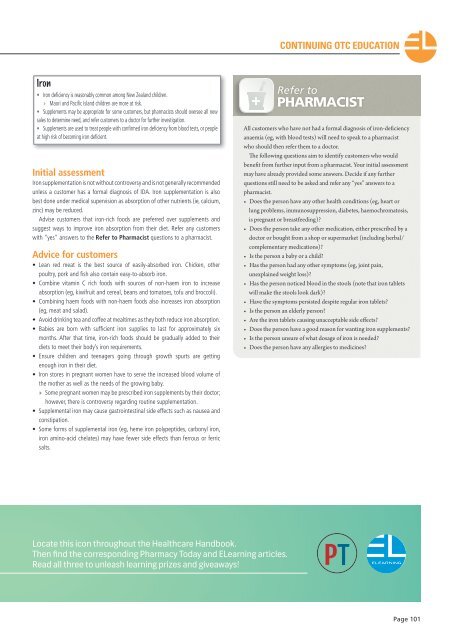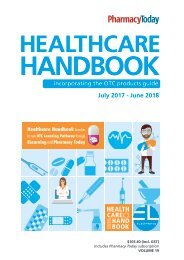2017 HCHB_digital
Create successful ePaper yourself
Turn your PDF publications into a flip-book with our unique Google optimized e-Paper software.
CONTINUING OTC EDUCATION<br />
Iron<br />
••<br />
Iron deficiency is reasonably common among New Zealand children.<br />
»»<br />
Maori and Pacific Island children are more at risk.<br />
••<br />
Supplements may be appropriate for some customers, but pharmacists should oversee all new<br />
sales to determine need, and refer customers to a doctor for further investigation.<br />
••<br />
Supplements are used to treat people with confirmed iron deficiency from blood tests, or people<br />
at high risk of becoming iron deficient.<br />
Initial assessment<br />
Iron supplementation is not without controversy and is not generally recommended<br />
unless a customer has a formal diagnosis of IDA. Iron supplementation is also<br />
best done under medical supervision as absorption of other nutrients (ie, calcium,<br />
zinc) may be reduced.<br />
Advise customers that iron-rich foods are preferred over supplements and<br />
suggest ways to improve iron absorption from their diet. Refer any customers<br />
with "yes" answers to the Refer to Pharmacist questions to a pharmacist.<br />
Advice for customers<br />
• Lean red meat is the best source of easily-absorbed iron. Chicken, other<br />
poultry, pork and fish also contain easy-to-absorb iron.<br />
• Combine vitamin C rich foods with sources of non-haem iron to increase<br />
absorption (eg, kiwifruit and cereal, beans and tomatoes, tofu and broccoli).<br />
• Combining haem foods with non-haem foods also increases iron absorption<br />
(eg, meat and salad).<br />
• Avoid drinking tea and coffee at mealtimes as they both reduce iron absorption.<br />
• Babies are born with sufficient iron supplies to last for approximately six<br />
months. After that time, iron-rich foods should be gradually added to their<br />
diets to meet their body’s iron requirements.<br />
• Ensure children and teenagers going through growth spurts are getting<br />
enough iron in their diet.<br />
• Iron stores in pregnant women have to serve the increased blood volume of<br />
the mother as well as the needs of the growing baby.<br />
»»<br />
Some pregnant women may be prescribed iron supplements by their doctor;<br />
however, there is controversy regarding routine supplementation.<br />
• Supplemental iron may cause gastrointestinal side effects such as nausea and<br />
constipation.<br />
• Some forms of supplemental iron (eg, heme iron polypeptides, carbonyl iron,<br />
iron amino-acid chelates) may have fewer side effects than ferrous or ferric<br />
salts.<br />
Refer to<br />
PHARMACIST<br />
All customers who have not had a formal diagnosis of iron-deficiency<br />
anaemia (eg, with blood tests) will need to speak to a pharmacist<br />
who should then refer them to a doctor.<br />
The following questions aim to identify customers who would<br />
benefit from further input from a pharmacist. Your initial assessment<br />
may have already provided some answers. Decide if any further<br />
questions still need to be asked and refer any “yes” answers to a<br />
pharmacist.<br />
• Does the person have any other health conditions (eg, heart or<br />
lung problems, immunosuppression, diabetes, haemochromatosis,<br />
is pregnant or breastfeeding)?<br />
• Does the person take any other medication, either prescribed by a<br />
doctor or bought from a shop or supermarket (including herbal/<br />
complementary medications)?<br />
• Is the person a baby or a child?<br />
• Has the person had any other symptoms (eg, joint pain,<br />
unexplained weight loss)?<br />
• Has the person noticed blood in the stools (note that iron tablets<br />
will make the stools look dark)?<br />
• Have the symptoms persisted despite regular iron tablets?<br />
• Is the person an elderly person?<br />
• Are the iron tablets causing unacceptable side effects?<br />
• Does the person have a good reason for wanting iron supplements?<br />
• Is the person unsure of what dosage of iron is needed?<br />
• Does the person have any allergies to medicines?<br />
Locate this icon throughout the Healthcare Handbook.<br />
Then find the corresponding Pharmacy Today and ELearning articles.<br />
Read all three to unleash learning prizes and giveaways!<br />
Page 101



